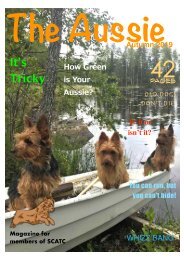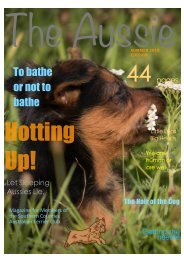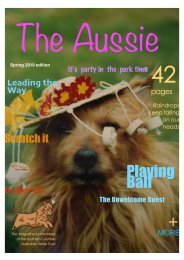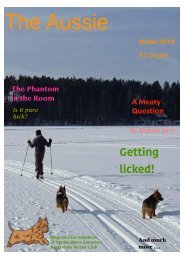The Aussie - Summer 2020 final
Magazine for members of the Southern Counties Australian Terrier Club
Magazine for members of the Southern Counties Australian Terrier Club
Create successful ePaper yourself
Turn your PDF publications into a flip-book with our unique Google optimized e-Paper software.
When your dog does something like raid the bins, or destroy
the cushions, and you walk in on it, it’s natural to think that
your dog knows beUer, as he looks guilty or does not even
greet you.
You imagine the dog is giving you the middle doggie digit, or
even being just plain vengeful. Or, maybe the dog is just plain
stubborn. When you see your dog has done, or is doing,
something it shouldn’t, it’s natural to feel frustra<on, maybe a
bit of anger mixed in with disappointment. And it becomes a
session of judgement… someone is to blame and that
someone is the dog because he is guilty of the misdeed.
What if we suspend the feelings of frustra<on, anger and
judgement for a short while when looking at all the naughty
behaviours our dogs do. When it comes to people, we believe
they are doing the best they can with the educa<on they have
and the environment that they’re put in. I believe our dogs are
doing the same. Our dogs are doing the best they can with the
educa<on we have given them, in the environment we’ve
asked them to perform in.
When it’s simple
With anything your dog is doing at any point in his life; what if
it’s the best he can do? If he takes a toy and does not bring it
back, if he ignores you calling him, if he chases the neighbour’s
cat … what if it’s the best he can do with the educa<on you
have given him, in the environment he is in at that <me?
Some<mes it can be really difficult to believe that it is the best
your dog can do! We have tried to invest so much <me and
effort into him. He is top of the class at training, therefore
these misdemeanours are on him.
Let’s look at training and behaviour from one of the first things
a dog is taught. House training. A pup arrives and generally is
not house trained and everyone is aware that is has to be a
121 learning with us and our pup. We all know that ini<ally
there are going to be accidents. But eventually we help our
dog to understand that we want them to do. We don’t start
yelling at our pup in the early stages for having an accident,
because we understand he is doing the best he can and any
accident is on us, because maybe we fed him and didn’t take
him outside, didn’t realise that they can get excited and have
accidents, or forgot their bladders can’t cope with our Sunday
morning lie in. We understand we are in this together with our
puppy and will have success in the end.
As <me goes by we are certain our dog is housetrained, but he
then has an accident inside… we instantly think all is not well,
we monitor him and maybe even head to the vet fearing a
kidney infec<on or whatever response has come from an online
search. We believe our dog is doing the best he can, so
this accident is not his fault.
So, what is the difference between something like
housetraining and chasing deer? The difference is that every
distrac<on we add to our dog’s behaviour, we are adding a
layer of complexity. With house training, your dog grows to
dis<nguish the difference between inside and outside because
you know the steps and how to set him up for success.
When things get tricky
Let’s look at a seemingly simple behaviour. “Sit” is
something nearly everyone will train their dog to do at
some point. Most likely your dog will sit every <me you ask
when you have a treat and are in your kitchen. But then you
are in the garden and ask your dog to sit, but you don’t
have a treat … chances are that sit is not going to happen.
Performing the behaviour in the garden where there might
be birds, squirrels, or the neighbour’s dog running back and
forth is a different environment to being in the kitchen
when a treat is readily accessible. It’s a massive increase in
complexity for the dog, if he has not been prepared for it in
his educa<on.
There are layers of learning to any behaviour we want to
teach our dogs. Distrac<ons are added strategically to
protect our dog’s confidence and grow his capability to
perform the behaviour anywhere. Layering the learning
leads to our dogs being able to make complex decisions in
the face of distrac<ons. This is why there are an increasing
number of classes offering ways to make the basic training
in a village hall more appropriate to today’s environment.
Your dog is doing the best he can with the educa<on you
have given him, in the environment you’ve asked him to
perform in.
I’m Sorry
It is important to understand that dogs are great at figuring
out paUerns of reinforcement and punishment, and they
want to avoid that punishment. That’s why your dog might
appear ‘guilty’, but in reality all he is doing is avoiding
punishment. If he has destroyed the cushions and you come
home and he does not greet you at the door, it’s not
because your dog feels guilty. It’s because the associa<on of
bits of cushion on the floor and you coming home means he
knows there is not going to be a happy welcome.He is not
stupid and realises it’s best to avoid you because it’s a
paUern for punishment.
Think about it – are his misdemeanours really him rebelling,
or simply doing the best he can? What does that idea do
when you turn the magnifying glass on yourself? When we
think our dog is doing his best, we can ask ourselves the
cri<cal ques<ons like: Did I put my dog in the right
environment? Did I give him enough educa<on?
If you’re honest with yourself, and you think – yes that’s
right maybe I didn’t give him the right educa<on; too much
freedom that he was not ready for, and you put him in an
environment where he did not have enough experience
with to be able to make good decisions.
It’s like giving your 16 year old the keys to your Masera<,
the same day you gave him the keys to your drinks cabinet
…. that’s too many choices and some bad ones are going to
be made …. and that’s what happens with our dogs.









